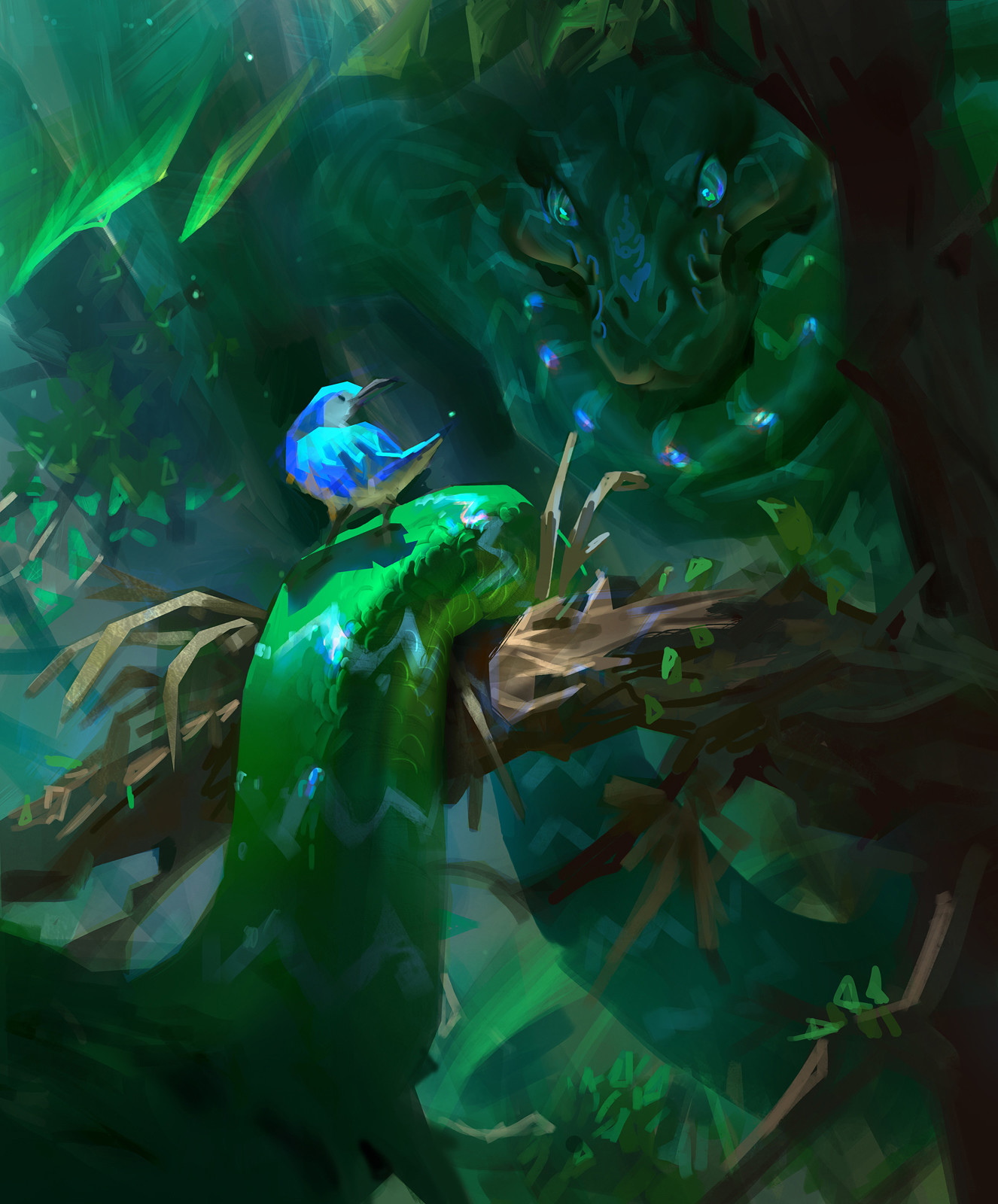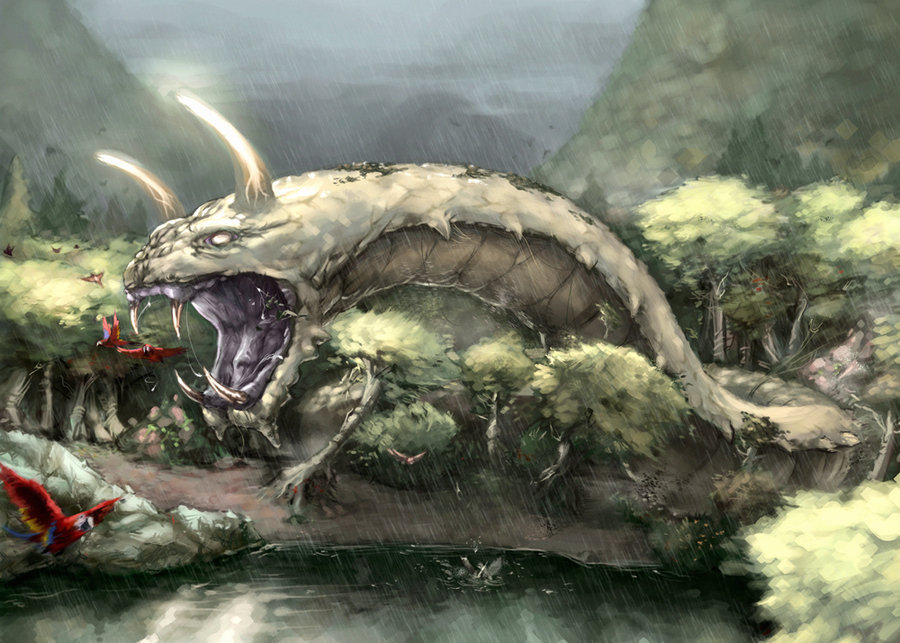Если у тебя, Странник, чешется между лопатками или растет копчик, то ты пришел по адресу!
Bestiary.us
энциклопедия вымышленных существБыстрый переход
- Средиземье Средизе́мье (англ. Middle-earth, буквально Среди́нная земля́, также существуют варианты перевода Среднеземье, Средьземелье) — одна из первых и самых известных фэнтези-вселенных. Оно является местом действия основных произведений Дж.Р.Р.Толкина, а также «вольных продолжений» других авторов.
- Японская мифология и фольклор Система сакральных знаний страны восходящего солнца, включающая традиции синтоизма и буддизма, а также многочисленные народные поверья и городские легенды, содержит огромное количество ками («божество» или «дух»), ёкай («призрак» или «демон») и хэнгэёкай («звери-оборотни»).
- Мир Гарри Поттера Вымышленный мир, в котором происходит действие серии романов о юном волшебнике Гарри Поттере. Действие происходит в нашем мире, в Англии, в 1990-х годах. В отличие от реального мира, среди обычных людей (маглов) живут волшебники (маги), обладающие способностью к использованию магии.
Монаи
Монаи — один из семи легендарных монстров мифологии южноамериканских индейцев гуарани, огромный рогатый змей, страдавший клептоманией
Moñái — one of the seven legendary monsters from mythology of Guaraní (South American indigenous people), an enormous serpent-like creature with two straight, colorful horns over his head
Монаи — один из семи легендарных монстров мифологии южноамериканских индейцев гуарани, огромный рогатый змей, страдавший клептоманией
Moñái — one of the seven legendary monsters from mythology of Guaraní (South American indigenous people), an enormous serpent-like creature with two straight, colorful horns over his head
Монаи — один из семи легендарных монстров мифологии южноамериканских индейцев гуарани, огромный рогатый змей, страдавший клептоманией
МонаиОдин из семи легендарных монстров мифологии южноамериканских индейцев гуарани, огромный рогатый змей, страдавший клептоманией по-русскиMoñáiOne of the seven legendary monsters from mythology of Guaraní (South American indigenous people), an enormous serpent-like creature with two straight, colorful horns over his head in english
Moñái —
Монаи — один из семи легендарных монстров мифологии гуарани, группы индейских народов в Южной Америке, проживающих, в основном, на территории Парагвая, а также в соседних с Парагваем районах Бразилии, Уругвая, Аргентины (провинция Мисьонес) и Боливии. Он был третьим сыном духа зла Тау и прекрасной дочери богов Кераны, и выглядел как огромный змей с прямыми радужными рогами-антеннами, дававшими ему способности к телепатии и гипнозу. Монаи называли «господином воздуха» и открытых пространств. Он способен был с легкостью взбираться на деревья и скользить по ним, охотясь на птиц, которыми питался и управлял с помощью гипнотической силы своих антенн.
Монаи страдал клептоманией, а результаты своего воровства скрывал в пещере. Его непрерывные грабежи вызвали раздор среди людей, так как все обвиняли друг друга в пропаже имущества. Наконец, люди объединились, чтобы положить конец проступкам Монаи и его братьев. Прекрасная Порася вызвалась сама выполнить эту миссию. Она убедила Монаи, что влюбилась в него и что прежде, чем они отпразднуют свою свадьбу, она желает встретиться со всеми его братьями. Монаи оставил её на попечение Тейю Ягуа и ушёл искать остальных братьев: Мбои Туи, Ясы Йатере, Курупи, Луисона и Ао Ао. Когда он, наконец, собрал их всех, начались свадебные обряды, братья-монстры обменивались тостами и быстро напились. В этот момент Пораси попыталась бежать из пещеры, вход в которую был завален огромным камнем. Монаи помешал ей сбежать и бросил обратно в пещеру. Пораси закричала, чтобы предупредить людей, которые ожидали снаружи. Зная, что обречена, она приказала людям сжечь пещеру. И хотя это было чистым самоубийством для Пораси, ее поступок также разрушил проклятие потомков Тау и Кераны, включая самого Монаи. В обмен на жертву Пораси, боги подняли её душу на небо и превратили в сияние утренней зари.
Moñái is one of the seven legendary monsters from mythology of Guaraní (indigenous people living in Paraguay, the Misiones Province of Argentina, southern Brazil, and parts of Uruguay and Bolivia). He is the third son of evil spirit Tau and Kerana, the beautiful daughter of Gods. This creature has an enormous serpent-like body with two straight, colorful horns over his head, which serve as antennae. His dominions are the open fields. He can climb trees with ease and slide down to hunt the birds on whom he feeds and dominates with the hypnotic power of his antennas. Because of this he is called "the lord of the air".
Moñái is fond of stealing and hiding the products of his misdeeds in a cave. His continuous robbing and raiding in the villages provoked great discord among the people as they all accuse each other for the robberies and mysterious "disappearances" of their belongings. The people joined to put an end to Moñái's misdeeds and those of his brothers. The beautiful Porâsý offered herself to carry out this mission. She convinced Moñái that she had fallen in love with him and that before they celebrated their wedding she wanted to meet his brothers. Moñái left her in the care of Teju Jagua and left to search for the rest of his brothers: Mbói Tu'i, Yasy Yateré, Kurupí, Luisón, and Ao Ao. When he finally brought them all they began the wedding rituals. The brothers exchanged the drinks freely and quickly became completely drunk. It was in this moment that Porâsý attempted to escape from the cave which was closed off by a huge stone. Moñái prevented her from leaving and threw her back into the cave. Porâsý screamed to alarm the people who were waiting outside. Knowing that she was lost she ordered the people to burn the cave, even with her inside. While this killed Porasy herself, it also successfully destroyed Tau and Kerana's cursed descendants, including Moñai himself. In return for the sacrifice of Porâsý, the gods lifted her soul and changed it into a small but intense point of light. Since then, the gods destined the spirit of Porasy to light up the aurora.
Статус статьиСтатус артыкулаStatus artykułuСтатус статтіArticle status:
Заглушка (пустая страница, созданная чтобы застолбить неопределенно запланированную статью, либо чтобы прикрыть ведущую из другой статьи ссылку)
Подготовка статьиПадрыхтоўка артыкулаPrzygotowanie artykułuПідготовка статтіArticle by:
Адрес статьи в интернетеАдрас артыкулу ў інтэрнэцеAdres artykułu w internecieАдрес статті в інтернетіURL of article: //bestiary.us/monai



Культурно-географическая классификация существ:
Культурна-геаграфічная класіфікацыя істот:
Kulturalno-geograficzna klasyfikacja istot:
Культурно-географічна класифікація істот:
Cultural and geographical classification of creatures:
Ареал обитания:
Арэал рассялення:
Areał zamieszkiwania:
Ареал проживання:
Habitat area:
Псевдо-биологическая классификация существ:
Псеўда-біялагічная класіфікацыя істот:
Pseudo-biologiczna klasyfikacja istot:
Псевдо-біологічна класифікація істот:
Pseudo-biological classification of creatures:
Физиологическая классификация:
Фізіялагічная класіфікацыя:
Fizjologiczna klasyfikacja:
Фізіологічна класифікація:
Physiological classification:
Форумы:
Форумы:
Fora:
Форуми:
Forums:
Еще? Еще!
Тейю Ягуа — один из семи легендарных монстров мифологии южноамериканских индейцев гуарани, огромный ящер с семью собачьими головами и глазами, извергающими огонь
Мбуи Туи — один из семи легендарных монстров мифологии южноамериканских индейцев гуарани, ужасающий змей с головой попугая
Луисон — один из семи легендарных монстров мифологии южноамериканских индейцев гуарани, демон смерти, впитавший в себя характеристики европейских оборотней и дьявольских псов
Ао Ао — один из семи легендарных монстров мифологии южноамериканских индейцев гуарани, огромный плотоядный парнокопытный зверь
Бойтата — в фольклоре бразильских индейцев тупи-гуарани гигантская огненная змея, тело которой покрыто светящимися глазами съеденных ею жертв
Куэлебре — в низшей мифологии Астурии и Кантабрии, опасный крылатый змей, охраняющий сокровища в своем логове в пещере у источника
Чупакабра — в странах Латинской Америки и на юге США мифическое существо, убивающее домашних животных и высасывающее у них кровь
Брукса — португальский вампир исключительно женского пола, в которого после смерти превращается женщина, занимавшаяся при жизни колдовством
Сисиютль — в мифах квакиутлей и других племен северо-западного побережья Северной Америки морской двухголовый змей
Мапингуари — в бразильском фольклоре и криптозоологии одноглазое лесное существо с пастью на животе
Пьючен — в мифологии коренного населения Чили, Перу и Аргентины вампир-оборотень в облике змеи с крыльями летучей мыши
Хапиньюньюс — согласно фольклору южноамериканского народа аймара, крылатые демоницы с длинными отвисшими грудями, которые похищают у людей души, принимая вид красивых девушек
Яюй — китайский дракон, живущий в водах Жошуй
Скарбник — в славянском фольклоре дух-хранитель, опекун или хозяин богатств земли, горных недр, а также заколдованных кладов
Стуканцы — в корнуоллском фольклоре горные фейри, искусные рудокопы, которым известно местонахождение каждой жилы в толще скал
Гаргулец — гад преогромный, дракон водный с шеею зело длиною, мордою вытянутою и буркалами, аки карбункулы светящимися
Аврага Могой — в монгольских легендах гигантский дракон-змея с 27 головами и 33 хвостами



Comments
Отправить комментарий